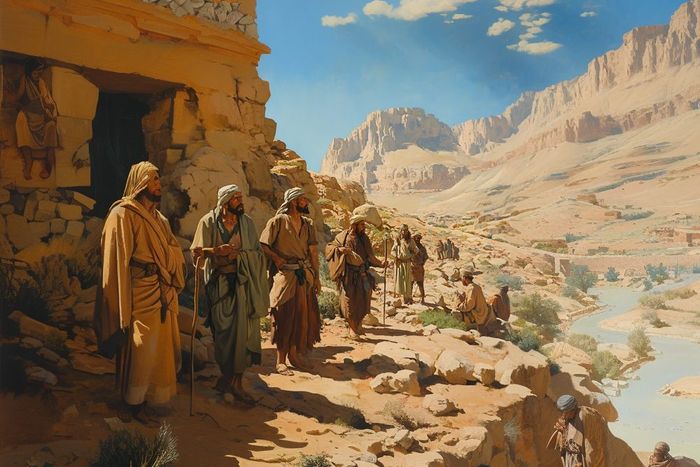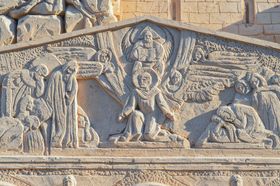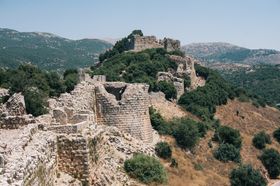Who Was Moab, the Son of Lot? A Biblical Tale
In the aftermath of Sodom's destruction, a tale of survival unfolds through Moab's controversial birth—a narrative that challenges moral boundaries and divine grace.
Updated November 28, 2024.

Moab's origin story is one of the Bible's most morally complex tales. It begins with a disturbing act of incest between Lot and his eldest daughter after the destruction of Sodom and Gomorrah.
This birth story raises profound theological questions. It explores God's mercy, which extends beyond traditional moral boundaries. It also highlights human survival instincts that can lead to difficult choices. And it reveals God's redemptive plan, which works even within human limitations.
Beyond a mere historical account, Moab's story invites us to contemplate human vulnerability, divine grace, and the surprising ways redemption can arise from seemingly hopeless situations.
Who Was Lot and What Was His Role in the Bible?
Lot was Abraham's nephew and a key figure in the book of Genesis. He joined Abraham on his journey to the Promised Land but later chose to live in the wicked city of Sodom. This decision had serious consequences.
God's mercy saved Lot from the destruction of Sodom and Gomorrah. After fleeing the city, Lot and his daughters sought shelter in a cave. Believing they were the last people on Earth, his daughters deceived him into having children. One of these children was Moab, the ancestor of the Moabite nation.
The Moabites, who often opposed Israel, are a reminder of God's sovereignty over nations. Even in the face of human sin and failure, God works out His plan.
» Read the Bible with clarity! Learn the optimal reading order
The Birth of Moab: A Controversial Origin Story
The Bible tells us that Moab was born to Lot and his oldest daughter. This story goes against traditional ideas of purity and family. In ancient Hebrew culture, these things were very important. But, it also shows God's mercy, as He allowed the Moabites to be part of Israel's history, even though they came from a sinful beginning.
Moab's birth is a difficult topic because it involves incest, which the Bible strongly condemns. While some ancient cultures might have seen this differently—especially in desperate situations—religious traditions often view it as a serious sin. The Moabites' origins influenced their complicated relationship with Israel, marked by both conflict and cooperation.
Order a Piece of the Holy Land to Your Doorstep:
What Happened to Moab in the Bible?
The Bible doesn't tell us much about Moab's personal life. What's more important is his role as the ancestor of the Moabite people. His legacy is shaped more by what his descendants did, especially their conflicts with Israel, than by anything he did himself.
We can learn about the Moabites from stories in the Bible. For example, in Numbers 22–24, a Moabite king named Balak tried to get a prophet named Balaam to curse the Israelites. In Judges 3, another king, Eglon, oppressed the Israelites. These stories show that the Moabites often fought against God's people and had different religious beliefs.
The Moabites—the descendants of Moab—worshiped a god named Chemosh, which set them apart from the Israelites. They often fought against Israel but sometimes worked together, like in the story of Ruth. Their different beliefs and practices made them distinct from the Israelites, who had a special relationship with God.
The Moabites became a nation that lived east of the Dead Sea. They fought with the Israelites and sometimes even ruled over them. But, they also produced important people like Ruth, who became part of Jesus' family tree. This shows that even though they had conflicts, there were also moments of connection and redemption.
» Who shared Jesus' final moments? Read about the thief on the cross
The Decline and Fall of Moab
The Moabite nation declined over time, partly due to defeats in battle. King David conquered them, and later, the Babylonians destroyed them. These events fulfilled God's warnings against Moab, showing that He has power over nations.
The prophets Jeremiah and Isaiah wrote about God's judgment on Moab because of their pride and worship of false gods. Babylon's conquest of Moab fulfilled these prophecies and marked the end of the Moabite nation. This shows that turning away from God has consequences.
The Bible doesn't tell us exactly how the Moabites tried to survive, but they probably relied on their old ways and their worship of Chemosh. But, their nation eventually ended, which shows that it's pointless to resist God's plans.
» Follow Jesus's journey: Explore the most significant events in His life
From Brokenness to Blessing
Moab's story warns us about the dangers of sin and pride. In Judaism and Christianity, it reminds us that God is just but also merciful. We see this in Ruth, a Moabite woman who became part of Jesus' family tree. This shows that God can use anyone for His purposes.
Moab's story proves that God is in control, even when things don't look good. Ruth's story shows that no one is beyond God's grace. His plans are often bigger than we can imagine.








